2015 Summit Breakout Sessions
Women’s entrepreneurship
Issue experts:
- Kristie Arslan, Executive Director, Women Impacting Public Policy
- Nancy Clark, Owner, Glen Group, North Conway, NH
Session details:
For decades, women have been breaking the glass ceiling on small business ownership and entrepreneurship. In 1987, only 10% of U.S. small businesses were women-owned; in 2007, that number had soared to 30%. In fact, 9.1 million women are small business owners and women-owned businesses collectively contribute $1.4 trillion to the national economy each year. Despite this undeniable progress, the playing field for gender equality remains far from level. For starters, in the intervening years between now and 2007, the 30% ownership figure has barely budged.
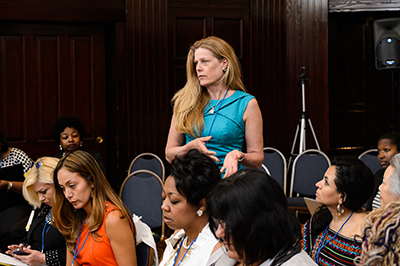
Summit attendees discussing policies to help women entrepreneurs thrive
Furthermore, women business owners lag their male counterparts in the crucial business indicators of revenue, number of employees and funding. Many factors continue to work against women entrepreneurs, among them less access to capital, fewer angel and venture capitalists willing to take a risk on them and health insurers who financially penalize them for being women (now outlawed by the Affordable Care Act). Many other factors affect working women in general, particularly those in lower-paying or “pink collar” jobs, including an absence of family medical leave benefits, paid sick days and retirement benefits; lack of affordable child care during working hours; and minimum wages that do not constitute a living wage. According to employment data, women make up 60% the lower-paying workforce.
This breakout session discussed the factors that have contributed to women’s progress in this arena, and the type of policies that should be instated that could give women the help they need to start truly smashing the entrepreneurship glass ceiling.
Minority entrepreneurship
Issue expert:
- Christine Chin Ryan, President, Synergy Consulting Inc., Portland, OR
Session details:
There are 5.8 million minority-owned businesses that together generate $1 trillion in revenue. Minority business development has been on the rise. The rate of minority business ownership in 2012 was 14.6 percent, compared with 11.5 percent in 2007. Black business owners made up 49.9 percent of all minority owners in 2012, while Asians made up 29.6 percent. The Hispanic share of all U.S. business owners was 10.3 percent in 2012, compared with 8.3 percent in 2007. This increase reflects the fast growth of the Hispanic labor force, spurred by overall population growth and increased immigration.
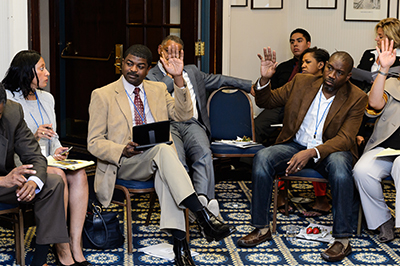
Small business owners participating in a breakout session about policies to support minority entrepreneurs
While minority entrepreneurship is slowly on the rise, there are a number of factors that temper that growth. For instance, an SBA study concluded that the major constraint limiting the growth, expansion, and wealth creation of small firms—especially women- and minority-owned businesses—is inadequate capital. Their access to capital is also held back by experience, geographic location, lower sales and industry sectors. According to the National Community Reinvestment Coalition, African-American businesses received 2.3% of Small Business Administration loans in 2013, down from 11% in 2008.
Other issues such as a lack of workforce development training for minority small business owners, stagnant movement in government contracts, a lack of retirement benefits and more, all impact the growth of minority entrepreneurship. This panel discussed policies that could help move the needle to give minority entrepreneurs the help they need to thrive.
Freelance/micro-enterprise economy
Issue expert:
- Katie Vliestra, Vice President for Government Relations and Public Affairs, National Association for the Self-Employed
Session details:
More than 22 million microbusinesses have created their own jobs. The 3.6 million microbusiness owners who also employ others create an additional 1.7 jobs apiece, on average. Including both owners and workers, that adds up to approximately 32 million Americans who are currently employed by microbusinesses.
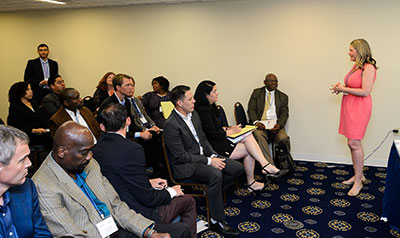
Katie Vliestra, V.P. of Government Relations & Public Affairs for the National Association for the Self-Employed, leading a breakout session on the freelance economy
What’s more, entrepreneurs are in the vanguard of an evolving 21st century economy that is shaping America’s new employment landscape—one where brick-and-mortar storefronts are being replaced by online retailers, and freelancers and contractors are the new version of the 9-to-5 office worker. In fact, employers are increasingly reliant on consultants and contract workers as a cost-cutting measure. As a result, self-employment is growing. MBO Partners, a consulting firm for independent workers, estimates that by 2020, fully half of all workers will have spent some time self-employed during their career.
This breakout session examined the impact of freelancers on the economy and how the U.S. can update policies that address the needs of this new workforce, along with the impact of microbusinesses and policies aimed specifically at helping the smallest businesses. Microbusiness owners and freelancers often experience financial instability if they lack the financial capability needed to manage business finances, have deeply intertwined business and personal finances, lack access to credit or have insufficient savings to provide a cushion against economic shocks and provide for a comfortable retirement. In fact, lack of savings is a critical financial challenge for microbusiness owners at virtually all levels of income. This session discussed policies intended to support the self-employed and very small firms to ensure that these workers can access resources that help them succeed when they do not have traditional wage employment.
New capital opportunities: Crowdfunding
Issues experts:
- Kim Wales, Founder & CEO, Wales Capital and CrowdBureau
- Amy Cortese, Journalist & Founder, Lovecasting Media
Session details:
Small, local businesses are forces for economic development—creating opportunity in the neighborhoods where they operate by providing jobs that lead to income growth and helping revitalize challenged areas far more than chain businesses. Studies show independent stores recirculate 52% of their revenue locally, compared to 16% of national chain stores’ revenue.
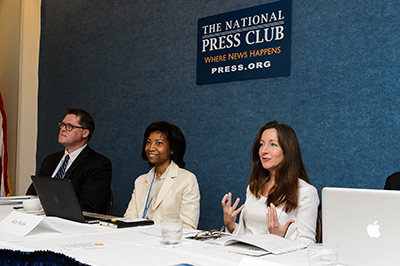
Kim Wales, Founder of Wales Capital and CrowdBureau, and Amy Cortese, Founder of Locavesting Media, outlining crowdfunding opportunities for small businesses
In the post-recession environment, small entrepreneurs continue to struggle to access the capital they need to start, run and grow their companies from the country’s traditional lenders. But the high-tech world sees this as an opportunity and online crowdfunding platforms have flourished. Though donation-based crowdfunding sites like Kickstarter and Indiegogo are in full swing and earn a lot of media attention, equity crowdfunding sites, which allow high-net-worth accredited individuals to invest directly in private companies online, also hold significant promise as a source of capital for small businesses. But they also face regulatory and policy hurdles before becoming accessible to the average American as an investment tool and, therefore, a significant source of small business capital. The JOBS Act of 2012 set the stage to open up equity crowdfunding to non-accredited investors—most of the population—but it also ignited a debate about responsible investing and rules have yet to be written.
This breakout session looked at the issues around crowdfunding, its promise and the perils it may create.
Workforce
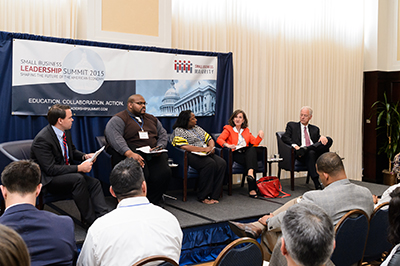
Small Business Majority staff and issue experts discussing public policies that can help ease workforce issues for entrepreneurs
Issue experts:
- Joyce Klein, Director, Aspen Institute Microenterprise Fund for Innovation, Effectiveness, Learning and Dissemination (FIELD)
- LaJuanna Russell, President & CEO, Business Management Associates, Inc., Alexandria, VA
Session details:
No matter what industry small business owners find themselves in, they all deal with similar workforce issues on a daily basis. Issues that include what to do when a trusted and valuable employee needs to take extended time off to care for a new baby or a sick loved one; minimum wages that constitute a living wage so they can attract and retain the kind of talent they need to run a successful business; whether to administer a retirement benefits package and if so, how to do so on a tight budget and with limited administrative resources; or how to instate a non-discrimination policy within their business because they believe it will help them attract and retain talent.
This panel addressed these workforce issues and more, and discussed public policies that can help relieve administrative burdens around many of these issues so entrepreneurs can spend more time doing what they’re good at—running the businesses that make up our nation’s economy.
Technology
Issue experts:
- Hibah Hussain, Public Policy Analyst, Google
- Zachary Davis, Co-owner, The Glass Jar, Santa Cruz, CA
Session details:
Technology is at the forefront of entrepreneurism today—it enables people to branch out into various sectors of the economy they wouldn’t have the opportunity to do so without it. Small entrepreneurs are in the vanguard of an evolving 21st century economy that is shaping America’s new employment landscape. The rise of the digital economy has elevated small business opportunities to new heights through innovative solutions to old business challenges, such as marketing, communications and financing. This advance in technology is providing entrepreneurs and small businesses with unprecedented freedom to work on their own terms, while leading to an extraordinary wave of innovation. However, there are hurdles the nation has to overcome in regards to advancing technology for entrepreneurs—namely maintaining net neutrality and an open Internet for all, and ensuring widespread broadband access across the country.
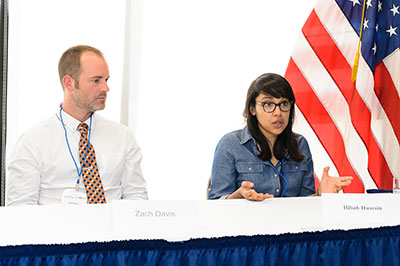
Zach Davis, co-owner of The Glass Jar, and Hibah Hussain, Public Policy Analyst for Google, discussing technology and infrastructure investments that can help entrepreneurs work on their own terms and allow small businesses to reach new markets
While broadband provides critical access to economic opportunities, jobs and innovation, approximately 19 million Americans still lack access. This means many entrepreneurs are not getting the broadband services they need to help their businesses thrive. Small businesses agree it’s time to address this problem so entrepreneurs in underserved areas can gain the access they need to markets, customers and services to support their operations. Infrastructure investments like broadband support the growth of a vibrant freelance and entrepreneurial economy that relies on the Internet for access to markets, customers and services to support operations
